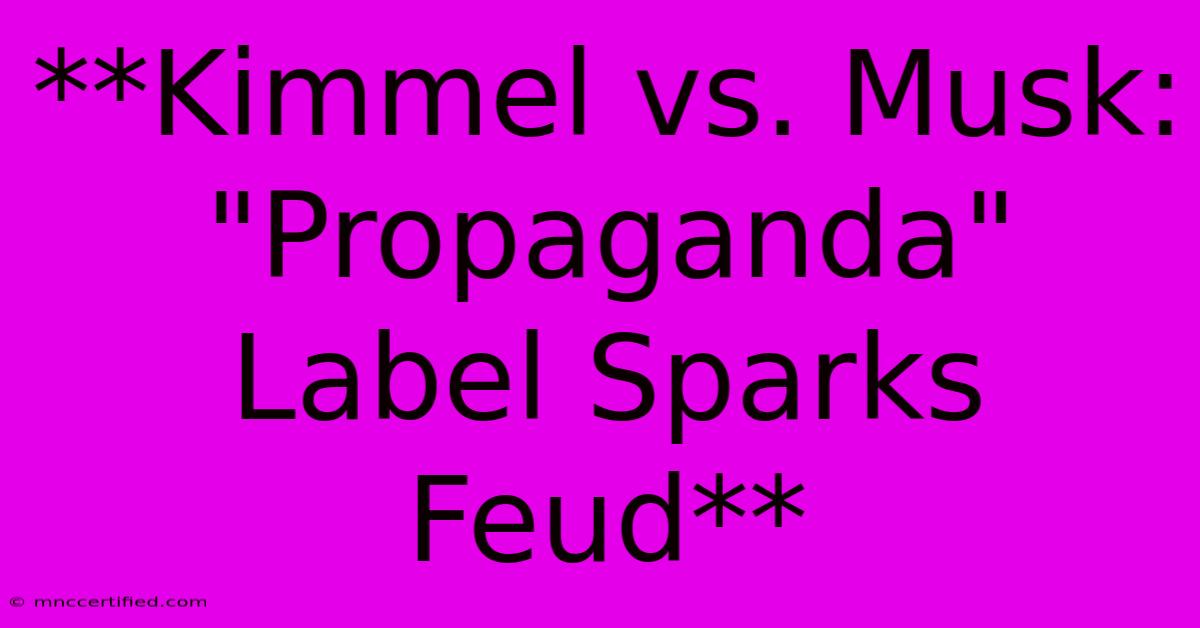**Kimmel Vs. Musk: "Propaganda" Label Sparks Feud**

Table of Contents
Kimmel vs. Musk: "Propaganda" Label Sparks Feud
The internet erupted with a fiery clash of words between late-night host Jimmy Kimmel and tech mogul Elon Musk, fueled by a single accusation: propaganda.
What sparked the feud?
The tension ignited when Kimmel, in a segment on his show, "Jimmy Kimmel Live!," criticized Musk's decision to label X, formerly Twitter, as a "propaganda platform." Musk, in turn, took to the platform he now owns to respond, calling Kimmel's comments "very low energy" and suggesting the host was "unaware of the deep-seated bias of traditional media."
The "Propaganda" Claim
Musk's use of the word "propaganda" was not a casual remark. It reflects his growing frustration with what he perceives as a systemic bias in traditional media, particularly regarding his own ventures. Musk has repeatedly accused mainstream outlets of misrepresenting his actions and failing to provide a fair and balanced perspective.
Kimmel's Response
Kimmel, in his segment, "Meanwhile, in the World of Elon," poked fun at Musk's recent antics, including the rebranding of Twitter to X and the unveiling of his brain-chip implant. However, the most controversial part of his critique was the accusation that Musk himself was engaging in "propaganda."
The Battle of Narratives
The feud highlights a broader battle for narrative control in the digital age. Musk, with his vast platform and influence, is attempting to shape public perception through X, while traditional media outlets, represented by Kimmel, continue to wield their own influence.
Beyond the Tweets
The Kimmel vs. Musk saga is more than just a celebrity feud; it reflects a deeper societal divide. It raises questions about the role of social media in shaping public opinion, the influence of powerful figures, and the ongoing struggle to access reliable information in a world saturated with narratives.
What's Next?
It remains to be seen how this public spat will evolve. Will Musk continue to use X as a platform to counter what he views as negative press coverage? Will Kimmel continue to satirize Musk's actions on his show? The battle for narrative control is far from over.
Key Takeaways
- The use of the term "propaganda" by Musk and Kimmel reveals a deep divide in how we perceive information in the digital age.
- The feud highlights the growing power of tech CEOs to influence public opinion through social media.
- The ongoing battle for narrative control is a complex issue that will continue to shape the digital landscape.

Thank you for visiting our website wich cover about **Kimmel Vs. Musk: "Propaganda" Label Sparks Feud** . We hope the information provided has been useful to you. Feel free to contact us if you have any questions or need further assistance. See you next time and dont miss to bookmark.
Featured Posts
-
Susie Wiles Trumps Latest White House Hire
Nov 08, 2024
-
Hearts Conference League Run Ends In Defeat
Nov 08, 2024
-
Season 4 Finale Outer Banks Showrunners Explain
Nov 08, 2024
-
Customer Onboarding Process In Insurance
Nov 08, 2024
-
Companion Protect Pet Insurance Reviews
Nov 08, 2024